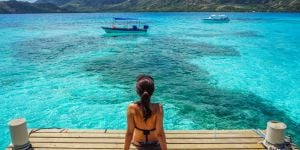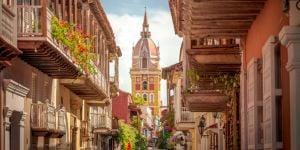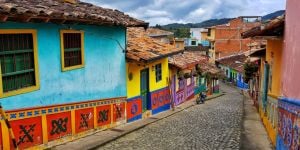Expatriation to Colombia: border updates
Last activity 07 November 2020 by cccmedia
1336 Views
17 replies
Subscribe to the topic
Post new topic
Hello everyone,
in Colombia as elsewhere, the current pandemic has changed our way of life but also our mobility, due to the state of borders of nearby countries or countries we wanted to visit.
Today we would like to take stock of the current border situation in Colombia and collect your testimonies, whether you are already an expat there or still preparing your move.
Is the country currently accessible to newcomers?
Have quarantine measures been put in place? If so, what are they?
What about leaving the territory as an expat resident? Will you be able to easily reach Colombia if you leave it temporarily?
How does the current borders state impact you, whether you are already an expatriate in Colombia or are planning to move there soon?
Do you have some visibility about the future of borders in your country of expatriation, in the longer or shorter term?
Thank you in advance for your contribution 
Cheryl,
Expat.com team
Colombia is resuming air travel for international passengers after a six-months ban, according to various online sites that follow the border and transportation scene. It is widely reported that September 21st will see the initial flights from other countries.
A requirement for entering Colombia is a covid test within 96 hours before flying. My research is unclear on whether a quarantine of up to 14 days upon arrival is required for covid-negative passengers.
According to the insurance website www.worldnomads.com,
maritime and land crossings into Colombia are closed to travelers until at least October 1st.
cccmedia
My take...
Expats should travel to and around Colombia only by plane.
Expats should visit only major cities and forego more rural places.
The covid death rate ranks among the higher rates in South America. The peace process is stalled or worse. Rural areas are no-man's land inadequately patrolled by police or the military in most places.
Bogotá is the covid epicenter of the country with one third of all cases.
Police authorities concentrate any efforts on protecting the major cities. In rural areas, bad actors have physically attacked suspected superspreaders of covid.
I was in Medellín earlier this year for a month, pre-covid. I felt safe in and around the Golden Mile where I stayed and would not have safety concerns to visit there again.
Areas to avoid due to health and safety concerns... any place near Venezuela, Nariño department in the south except for the city of Ipiales, metro Bogotá (disease and civil unrest), Parque Lleras in Medellín (excessive pollution).
A USA State Department web page recommends against any tourist travel to Colombia.
cccmedia
Cheryl wrote:What about leaving the territory as an expat resident? Will you be able to easily reach Colombia if you leave it temporarily?...
Do you have some visibility about the future of borders in your country of expatriation, in the longer or shorter term?
Colombia is a volatile place in a volatile covid time. Ipso facto, nobody can reliably predict the answers to these questions.
cccmedia
I received official notification via email from the US department of state today.
First commercial flights from US to Colombia will be September 19th with regular commercial service resuming 21 September.
Land and Sea borders will remain closed until at least October 1st.
All passengers inbound to Colombia require a negative PCR/Covid19 test result wiithin 96 hours of departure and complete a Migracion Colombia Check MIG-online form no more than 24 hours before departing for Colombia
Thanks for the information from the State Department, Marquezdl.
Was there any mention of a quarantine for arriving passengers?
cccmedia
If you comply with the above requirements, and download and use the Mobile App CoronApp to assist with contact tracing while in Colombia, then self quarantine will not be required
I live here and have been travelling around several Departments in the last few weeks. Not as much as normal, and avoid public buses (for health reasons) , only using private cars.
No more dangerous than normal.
As far as COVID, way safer in rural areas than in crowded cities.
Trick is just avoid crowds.
Of course getting into the country is pretty difficut now, and travel will still be, for quite a while be a bit bureaucratic and daunting for someone who has not lived here a while and doesnt know the country
If I was someone intersted in tourism in Colombia, even if you have been here a few times before, I would wait until Next Year, at the earliest.
nico peligro wrote:No more dangerous than normal....
If I was someone intersted in tourism in Colombia, even if you have been here a few times before, I would wait until Next Year, at the earliest.
We should point out that even in "normal" times, travel between Colombian cities at night is risky.
I learned this the hard way several years ago when two bad actors on motos chased me and my car south of Popayán, throwing rocks at the car till they saw me spin out on the highway and then left me alone.
Avoid night travel outside the cities and if you cannot avoid it, get off the roads at as early an hour as possible.
cccmedia
You cannot apply your experience in Cauca as a blanket statement applicable to all of Colombia.
I have gone by bus from Cali to Popayan a couple of times,and yes , I was recommended not to go at night. And there were some times , it was recommended not to go at all.
I am quite caiutious and if something makes me remotely uncomfortable, I ask a lot of questions and do a lot of research before doing it. Maybe that is why, in 8 years living in Colombia, and 16 years travelling here, I hav never had an experience like yours.
Not saying I havent done some pretty dumb things , but the 2 or 3 times I did , I got lucky and nothing happened.
Of course, as well. a foreigner in a private car with foreighn plates is an obvious target.
Parts of Cauca and Narino and other departments are still under Guerilla or para-military control.
The same reasoning doesnt apply in the Eje Cafetero, most of Antioquia, Santander, most of the Caribbean coast.
In Santander for instance, I have gone on bus trips with hiking groups on the back roads to small villages , we meat at 3 AM and came back at midnight the same day.
Travelling at night in Colombia all depends on where, when, with whom , and how.
Life is risk management..but one risk I wouldnt take is driving at night around Departamentos like Cauca or parts oF Nariño. Putamayo , Arauca and a few other departments at night alone in a private car with foriegn liscense plates..
To each his own..
A danger man with lots of experience in Colombia may be able to distinguish which parts of Cauca, Nariño, Santander, Antioquia, etc. are controlled by bad actors and which parts are safe.
For newbies, recent arrivals and those drivers with less ability to discern which stretches of road may be safe .. I think a good concept is to stay off all intercity roads of La República after dark.
cccmedia
Just over a month after the recommencement of unrestricted travel and complacency has set in. I boarded a bus from Bucaramanga bound for Bogota the other day and I was disappointed to observe my neighbor wasn’t wearing a mask for the duration of the trip. I asked the driver whether or not it was compulsory to wear a mask during the trip and the driver stated it was only necessary for passengers to wear a mask prior to boarding.
On my return voyage, another of my fellow travelers decided to remove his mask but this time the passenger was coughing and sneezing. He was clearly unwell and probably should not have been allowed to board.
My wife boarded a flight to Bogota today and the passengers were packed in like sardines. There were no seats left vacant and people were literally piled in on top of each other.
From these three isolated events, it appears the respective providers have chosen to disregard safety protocols set out by the government and have put profits ahead of the safety of their customers. Today my next door neighbor was carted off in an ambulance while attended by three people in full bio suits. She had a covering over her face and all I can do is hope she will be ok. Maybe if someone somewhere hadn’t put profit before safety, we would be enjoying our daily cup of coffee and a chat instead of her being in hospital and my now needing to pay for a covid test.
Colombians only pay attention to rules and laws if they think they are goin to get a multa (fine) or go to jail. Common sense is very uncommon.
I stay away from buses, Costs a lot more, but I hire a private driver, A bit more expensive than flying, but a loss less exposure to potential infection.
I visit restaurants, but we try to stay in the corner- away frm people and traffic coming in and out..
A couple times when there were too many people around spaced close together, I demanded they move us somewhere-anywhere were there were no or few people.
THe airlinse bring Maraichi bands and symphony Orchestras on the flights and spray saliva on everyone.
In Colombia, its every man for himself.
People cant hide in their bedroom for the rest of their lives. but have to take care of themeselves and not rely on the government.
And this is bizzarly ironic, because in late March until Juky, with few cases, everything was totally shut down-police check stops, fines. You could only leave the apartment 1 day a week to buy food based on your cedula,and couldnt even leave the apartment for exercises , except for 20 minutes a day if you had a dog.
People even ratted on us to the apartment omplex vigilantes (security) for walking up and down the stairwell for exercise.
Now , with 9000 to 12000 new cases and 200 deaths a day, the same sapos are probably out partying in a large group with their buddies, no tapa bocas, coughing and spitting on everyone.
nico peligro wrote:The airlines bring Mariachi bands and symphony orchestras on the flights and spray saliva on everyone.
Danger Man forgot to mention barbershop quartets and cheerleader squads. 
cccmedia
Well despite daily new case numbers (7 day average around 10,000 per day) and deaths (7 day average around 200 per day) being very high, they have opened up even more, eliminating the requirement for a PCR test when you enter the country.
In some departments, the iCUs are at 75% o 90% occupancy.
Colombia has (for now) embraced the "Wild West" approach to COVId, like Mexico.
From one extreme to another
nico peligro wrote:Now, with 9000 to 12000 new cases and 200 deaths a day, the same sapos (toads) are probably out partying in a large group with their buddies, no tapa bocas (face coverings), coughing and spitting on everyone.
The 'partying... spitting' parts seem to be mere speculation.
cccmedia
Articles to help you in your expat project in Colombia
 How to drive in Colombia
How to drive in ColombiaAny foreigner entering Colombia on a tourist visa is permitted to drive with the valid driver licence from their ...
 Leisure activities in Colombia
Leisure activities in ColombiaBoth visitors and those who stay long term in Colombia will have no shortage of things to do. Colombia's rich ...
 Phones and internet in Colombia
Phones and internet in ColombiaKeeping in touch with friends and family is a top concern no matter where you are living. In order to stay in ...
 The healthcare system in Colombia
The healthcare system in ColombiaHealthcare is a primary concern for anyone moving abroad and future expats will be happy to learn about the ...
 The Working Holiday Visa for Colombia
The Working Holiday Visa for ColombiaWhat makes Colombia unique is that it is one of the most diverse countries in the world, bordered by two oceans ...
 I Speak Colombian ? Words And Phrases That Will Help You Better Understand Colombia
I Speak Colombian ? Words And Phrases That Will Help You Better Understand ColombiaProbably the best thing about speaking Spanish in Colombia is that you can don’t have to really learn the ...
 Childcare, family activities and education in Colombia
Childcare, family activities and education in ColombiaFamily is extremely important to Colombians and many expats find it a great place to raise children. Colombia ...
 Accommodation in Colombia
Accommodation in ColombiaAs long as you know what to expect, finding and securing accommodation in Colombia isn't too difficult. Demand ...
Find more topics on the Colombia forum



